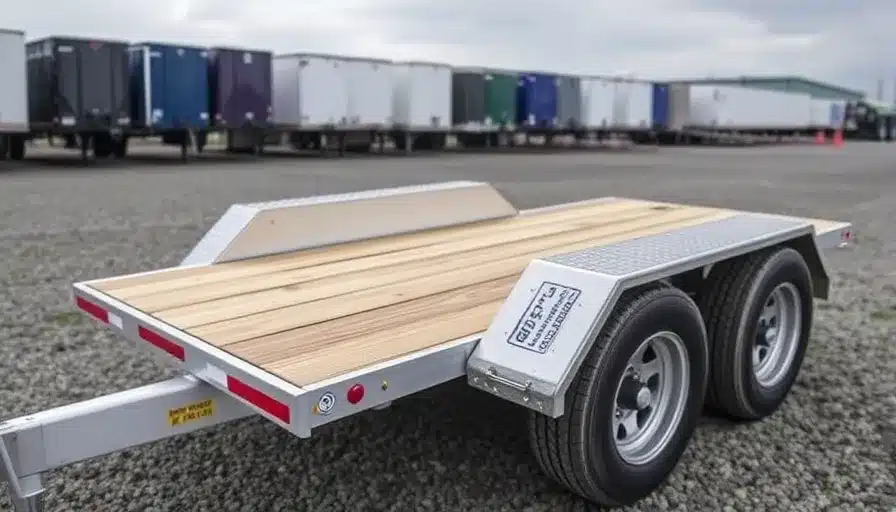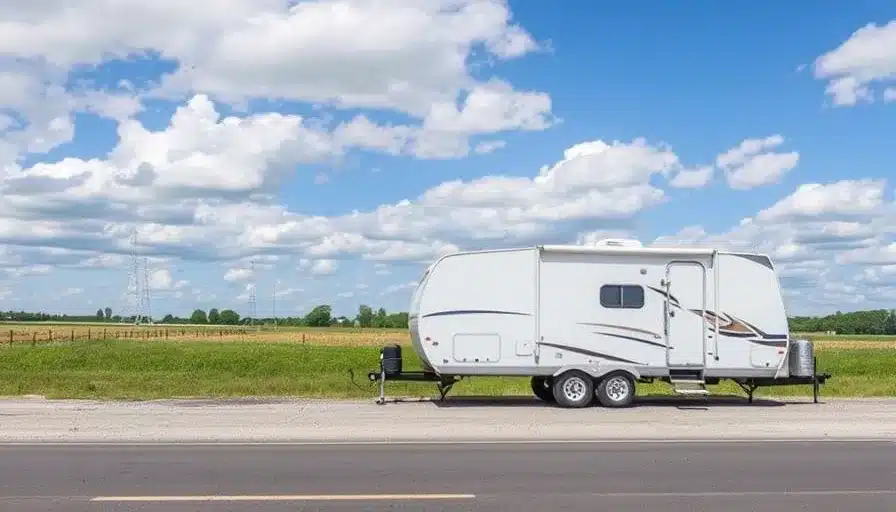Ever wondered how those massive trailers carrying everything from groceries to construction equipment manage to navigate the roads? The answer lies partly in their weight. Trailer weight is a crucial factor that goes beyond just brute strength. It significantly impacts:
- Safety: An overloaded trailer can become unstable, leading to accidents
- Fuel Efficiency: A heavier trailer puts more strain on the tow vehicle, guzzling more gas
- Legal Compliance: Exceeding weight limits can result in hefty fines and even road closures
So, before you hitch up and hit the road, learn about trailer weight with Millennium Trailers, where we understand trailer weight is essential. Come with us as we delve deeper and explore how much these workhorses actually weigh. Millennium Trailers works with you directly to build the custom trailer to your liking and one that works hard for you.
Understanding Trailer Weight
Trailer weight is a crucial factor for safe and legal operation. It plays a significant role in towing stability, fuel efficiency, and adherence to road regulations. To ensure a smooth ride, Millennium Trailers knows it’s essential to understand the different weight components and how they work together.
Key Terms
- Gross Vehicle Weight Rating (GVWR): This is the absolute maximum weight a trailer, including its cargo and fluids, is legally allowed to carry. It’s a critical safety rating assigned by the manufacturer and displayed on a sticker on the trailer itself. Exceeding the GVWR can compromise handling, braking, and overall stability, posing a danger to yourself and others on the road
- Tare Weight (Unladen Weight): This refers to the weight of the empty trailer itself, including all its standard features and fluids like oil and coolant. It’s essentially the weight of the trailer you’re purchasing before you add any cargo
- Cargo Weight: This is the total weight of all the items you load onto the trailer. It can include anything from furniture and building materials to boxes and recreational equipment
Trailer Weight vs. Cargo Capacity
Here’s where things can get confusing and where Millennium Trailer can be your trusted partner. Trailer weight (tare weight) is not the same as cargo capacity.
- Trailer weight is a fixed value – it’s the weight of the empty trailer
- Cargo capacity is the maximum amount of weight the trailer can safely carry in addition to its tare weight. This is calculated by subtracting the tare weight from the GVWR as follows:
Cargo Capacity = GVWR – Tare Weight
For example, if a trailer has a GVWR of 10,000 pounds and a tare weight of 5,000 pounds, its cargo capacity would be 5,000 pounds (10,000 pounds – 5,000 pounds). This means you can safely load up to 5,000 pounds of cargo onto that specific trailer.
Factors Affecting Trailer Weight
Trailer size, particularly length, definitely plays a role in overall weight. However, it’s not always a straightforward relationship. Here’s a breakdown of how size influences trailer weight:
The question of trailer weight is a crucial one for anyone planning to tow. While these workhorses haul a vast array of cargo, their own weight plays a significant role in safety, fuel efficiency, and legal compliance. So, how much do trailers weigh? The answer isn’t as simple as a single number. Trailer size certainly comes into play, but it’s just one piece of the puzzle. Let’s delve deeper and explore the factors that influence trailer weight.
The Size Factor
There’s a natural tendency to assume that bigger trailers automatically translate to heavier ones. This holds some truth, as trailer length increases, so does the amount of material needed for its construction. This applies to the frame, walls, and roof (for enclosed trailers), all translating to more weight. Additionally, larger trailers often require extra support features like reinforcement beams to maintain structural integrity, adding to the overall tare weight (weight of the empty trailer).
Material Choice and Added Features
However, size isn’t the sole factor when it comes to how much trailers weigh. Material selection plays a crucial role. Millennium Trailers uses the appropriate material for specific trailer types, particularly those built for fuel efficiency. This can subvert the size-weight correlation. Imagine a long enclosed trailer constructed with aluminum – it could potentially be lighter than a shorter trailer built with heavier steel.
Axles and Weight Distribution
Trailer size can also influence the number of axles needed. Longer trailers often require more axles to handle the increased load capacity. While additional axles add some weight themselves, they’re crucial for safety and stability, especially when hauling heavier cargo. Think of them as weight distributors, ensuring the load is spread evenly across the trailer frame and preventing overloading of any single axle.
While trailer size definitely plays a role in the question, “how much do travel trailers weigh” (or other types), it’s just one factor in the equation. Material selection, features, and axle configuration all contribute significantly. Generally, longer trailers tend to be heavier than shorter ones. However, construction materials and features can significantly impact weight – regardless of size
For example, a long flatbed trailer built with steel is likely to be considerably heavier than a shorter enclosed trailer made with aluminum.
Consult the Experts
The most accurate way to determine a specific trailer’s weight is to consult the manufacturer’s specifications. They will provide the exact tare weight and Gross Vehicle Weight Rating (GVWR), which is the maximum allowable weight for the trailer, including cargo and fluids. Don’t underestimate the importance of this information – it’s the key to safe and legal towing.
How Much Do Different Types of Trailers Weigh?
Knowing trailer weight is crucial for safe and legal towing, but trailers come in all shapes and sizes, and their weight can vary significantly. Here’s a closer look at the weight ranges for some common trailer types, keeping in mind these are averages and specific weights can differ depending on factors such as size, materials, and features:
How Much Do Utility Trailers Weigh?
- Small Open Utility Trailers (300-1,000 lbs): These compact trailers are ideal for hauling smaller cargo like lawn equipment or gardening supplies. Their lightweight design makes them easy to tow with most vehicles
- Enclosed Utility Trailers (1,000-2,000 lbs): Offering weather protection for your cargo, enclosed utility trailers come in a similar size range to open trailers but weigh slightly more due to the added walls and roof
- Large Utility Trailers (Up to 10,000 lbs): For bigger jobs and heavy-duty hauling, large utility trailers can handle significant loads. However, their weight can also increase considerably depending on size and features like ramps or reinforced frames
Travel Trailers: Hitting the Road with Comfort
Here’s how much travel trailers weigh:
- Small Travel Trailers (Pop-up Campers, Teardrop Trailers: 1,200-2,500 lbs.): These lightweight trailers provide basic camping accommodations while remaining easy to tow. Their weight makes them suitable for smaller vehicles
- Medium Travel Trailers (2,500-5,000 lbs.): Offering more space and amenities than their smaller counterparts, medium travel trailers are popular for weekend getaways or family camping trips. Their weight necessitates a tow vehicle with sufficient capacity
- Large Travel Trailers (Fifth-Wheel Trailers: Up to 18,000 lbs.): Luxury on wheels, large travel trailers offer spacious living quarters and all the comforts of home. However, their significant weight requires a powerful tow vehicle with a heavy-duty hitch
How Much Do Enclosed Trailers Weigh?
- Small Enclosed Cargo Trailers (Under 12ft: 900-2,700 lbs.): Perfect for hauling tools, equipment, or merchandise, these trailers provide secure storage with a relatively low weight, making them manageable for most vehicles
- Large Enclosed Cargo Trailers (Over 12ft: 2,700-5,200 lbs.): Offering more space for larger cargo needs, larger enclosed cargo trailers can get heavier depending on features like extra axles or heavy-duty doors
Equipment Trailers: Hauling What You Need
- Generally: 2,000-3,000 lbs.: Equipment trailers come in various configurations to transport specific equipment like motorcycles, ATVs, or construction tools. Their weight can vary depending on the type of equipment they are designed to carry. A motorcycle trailer will be lighter than one built for hauling heavy construction equipment
How Much Does a Toy Hauler Weigh?
- Car Trailers (1,000-3,000 lbs.): You might wonder – how much do car trailers weigh? These trailers come in different sizes to accommodate various vehicles, from motorcycles to large cars. Their weight reflects the size and capacity of the trailer
- Motorcycle Trailers (500 lbs.): Lightweight and easy to tow, motorcycle trailers are a convenient way to transport your motorbike
- Boat Trailers (Depending on Boat Size: 600-2,200 lbs.): The weight of a boat trailer hinges on the size and weight of the boat it carries. A trailer for a small fishing boat will be significantly lighter than one designed for a larger pontoon boat
- Gooseneck Flatbed Trailers (7,000-10,000 lbs.): These heavy-duty trailers feature a unique coupling system that places part of the trailer’s weight over the tow vehicle’s bed, improving stability. Their weight can vary depending on size and features
- Lowboy Trailers (Highly Variable, Often Exceeding 10,000 lbs.): Designed for hauling oversized or extremely heavy cargo, lowboy trailers are the behemoths of the trailer world. Their weight can be substantial, requiring specialized towing equipment
Remember: These are just starting points. Always refer to the manufacturer’s specifications for the exact tare weight of a specific trailer model before hitching up and hitting the road. By understanding trailer weight and its variations, you can ensure a safe and enjoyable towing experience.
Estimating Trailer Weight
Knowing the weight of your empty trailer (tare weight) is crucial for safe and legal operation. Here are some ways to find that information:
Manufacturer Specifications
- The most reliable way to determine the tare weight is to consult the manufacturer’s specifications. This information is usually included in the owner’s manual, on a sticker located on the trailer itself, or readily available on the manufacturer’s website
Weight Tags
- Some trailers, especially those commercially used, might have a weight tag permanently attached. This tag typically displays the tare weight and GVWR
Online Resources
- Many trailer manufacturers and dealerships have online resources where you can search for specific trailer models and access their specifications, including tare weight
Industry Averages (Use with Caution)
- As a last resort, you can find online resources that provide average tare weight ranges for different trailer types (as mentioned in the previous section). However, use this information with caution as specific weights can vary significantly based on size, materials, and features
Importance of Cargo Weight Distribution
While estimating the tare weight is important, it’s only half the equation. Safe travel relies heavily on proper cargo weight distribution. Here’s why:
- Stability: An unevenly loaded trailer can sway or fishtail while towing, significantly compromising stability and increasing the risk of accidents
- Axle Weight Limits: Each trailer axle has a weight limit. Uneven distribution can overload one axle and put undue stress on the trailer frame and suspension
- Tow Vehicle Strain: An improperly loaded trailer can put excessive strain on your tow vehicle’s engine, brakes, and suspension
Tips for Safe Cargo Weight Distribution
- Consult the owner’s manual: Your trailer manual will likely have specific recommendations for proper weight distribution based on the trailer model
- Load heavier items towards the front: This helps to place more weight on the trailer tongue, improving stability
- Secure your cargo: Use straps, tie-downs, and other securement methods to prevent items from shifting during transport
- Weigh your trailer (loaded): If possible, visit a weighbridge with your loaded trailer to ensure you’re within the GVWR and the weight is distributed properly
Conclusion
At Millenium Trailers, we know that trailer weight matters. We offer competitive prices, financing options, and friendly customer support to customers across the nation. It’s no wonder we’ve sold over 5,000 trailers to happy customers. Here’s our final takeaway for your convenience:
- Know the Numbers: Understand tare weight (empty trailer), cargo weight, and GVWR (max weight). Don’t overload!
- Size Matters (Kinda): Bigger trailers tend to be heavier, but materials and features play a role too
- Find Your Trailer’s Weight: Check manufacturer specs or weight tags. Online resources offer estimates, but you should seek specifics for accuracy
- Load Smart, Travel Safe: Distribute cargo weight evenly for stability and avoid overloading axles
Towing doesn’t have to be a weight. Stay informed with us and stay safe!
Bibliography
- Trailer Manufacturers Association (TMA). (n.d.). Trailer Manufacturers Association. https://www.trucktrailer.org/
- National Institute for Occupational Safety and Health (NIOSH). (n.d.). Centers for Disease Control and Prevention. https://www.cdc.gov/niosh/index.html
- U.S. Department of Transportation. Federal Motor Carrier Safety Administration (FMCSA). (n.d.). Federal Motor Carrier Safety Administration. https://www.fmcsa.dot.gov/
- American Society of Mechanical Engineers (ASME). (2020). Boiler and Pressure Vessel Code (ASME BPVC). Section VIII: Rules for Construction of Pressure Vessels.
- National Association of Trailer Manufacturers (NATM). (2023). NATM Recommended Practices for Safe Trailer Loading and Weight Distribution.



